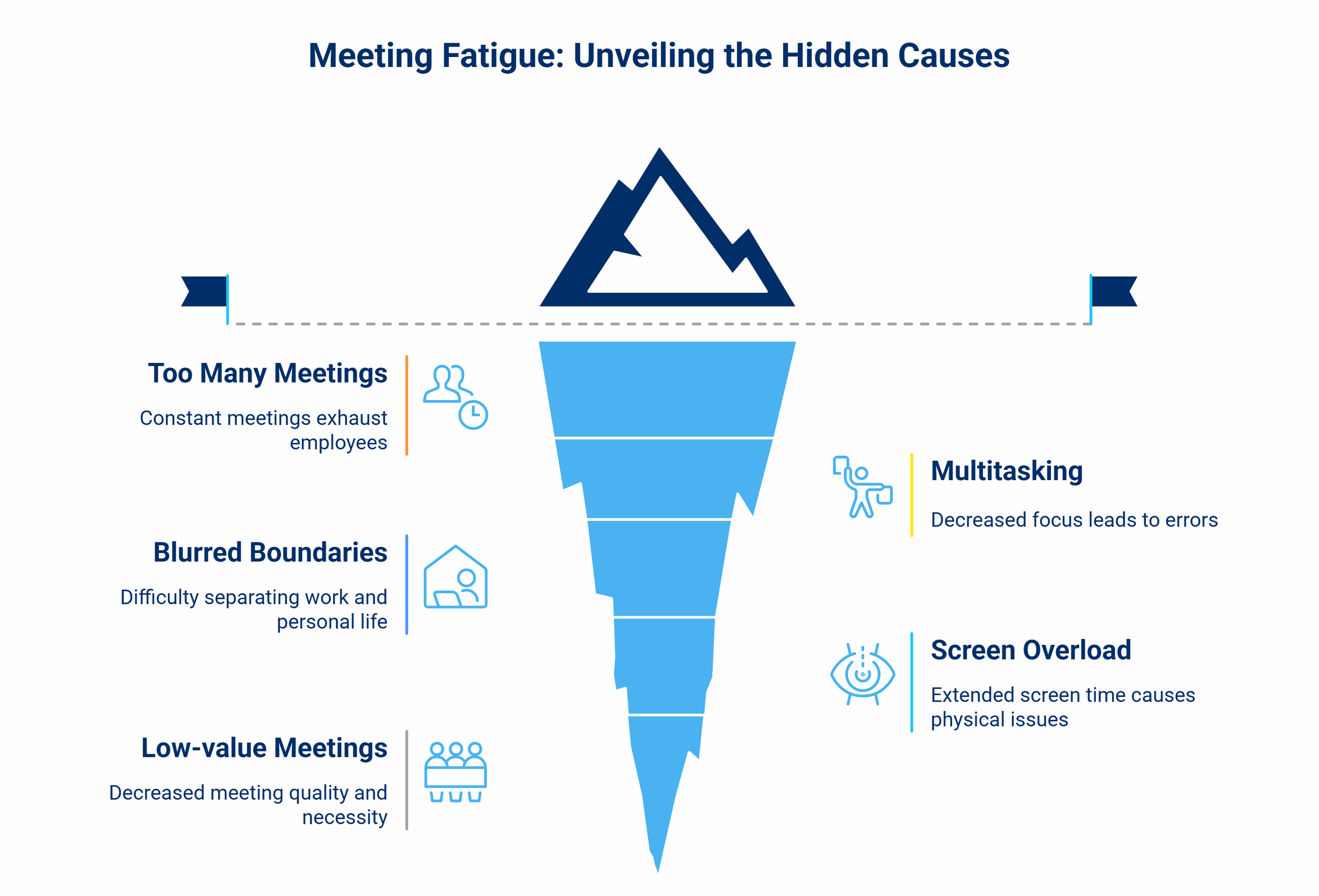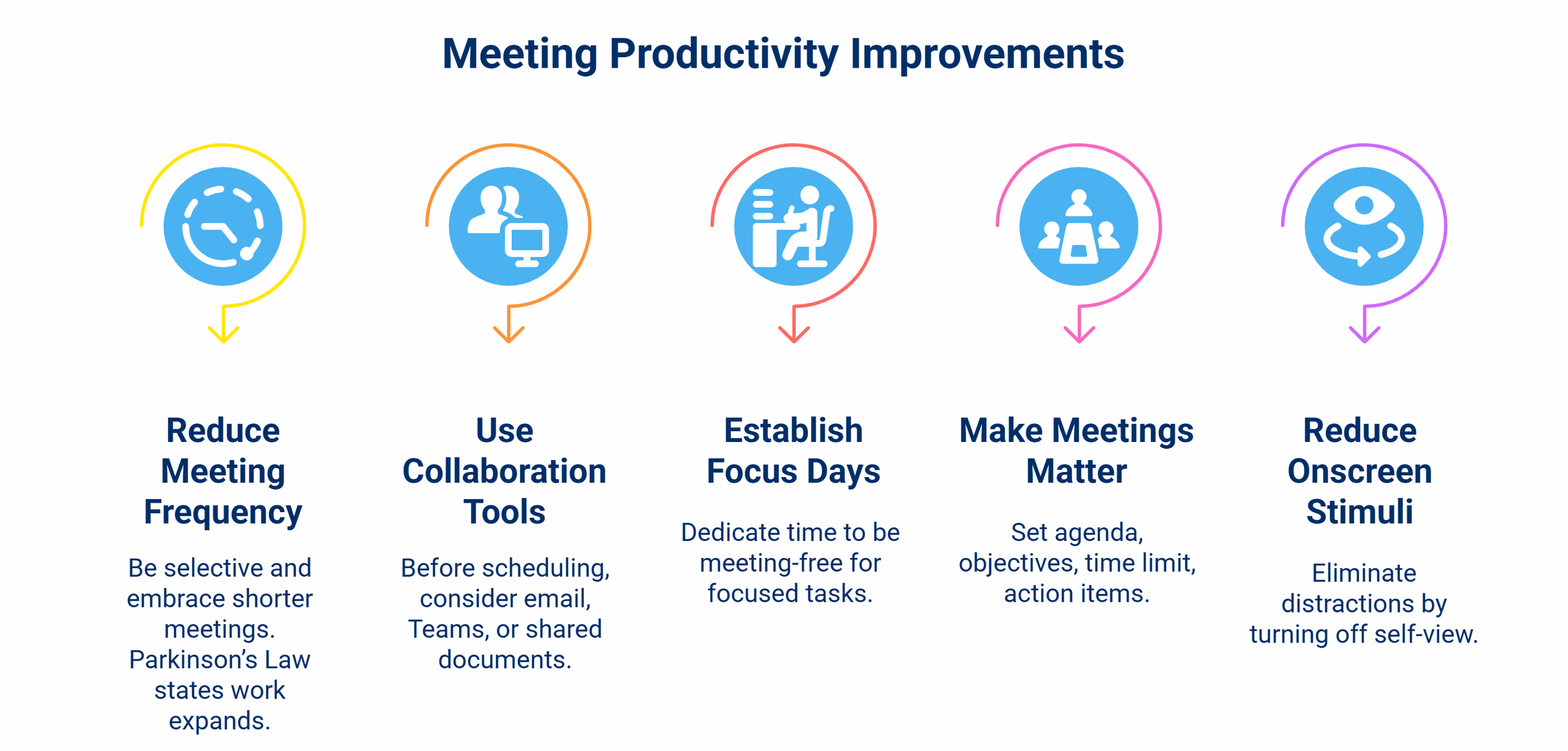Meeting Fatigue and How to Avoid It
Have you ever had to sit through a meeting that you felt could have been an email? Did you feel drained or exhausted by the end of it? You are not alone! In this new era of hybrid and remote work, meeting fatigue has become a serious problem—it is easy for mental exhaustion to creep in after days filled with back‑to‑back virtual meetings and packed calendars. Meeting fatigue can impact productivity, morale, and even mental health.
Meeting fatigue, sometimes called “Zoom fatigue,” is a collection of physical and psychological responses that comes from spending extended periods using Zoom or other videoconferencing platforms (see Webb, M. (2021). Zoom Fatigue and How to Prevent It. Journal of Registry Management, 48(4), 181). Symptoms include decreased attention and engagement, reduced productivity, increased stress, and burnout.
What Contributes to Meeting Fatigue?
Too Many Meetings
Constant meetings without breaks leave little room for actual work to be done and can lead to exhaustion, which can also lead to our next contributing factor.
Multitasking
The need or temptation to do other tasks during virtual meetings can result in decreased focus and can introduce errors into your work.
Blurred Boundaries
Remote or hybrid work can make it harder to separate work and personal life, and can make you feel like you always need to be “on” and can never truly be off work.
Screen Overload
Spending extended periods looking at your screen can cause physical issues, such as eye strain and even headaches.
Low‑value Meetings
When everyone is constantly attending or organizing meetings, there is the potential for the meeting’s quality to decrease; they can become unnecessary and/or poorly run.
How to Combat Meeting Fatigue
Reduce Meeting Frequency and Duration
Be selective about what meetings you accept and embrace shorter ones! Parkinson’s Law states that “work expands to fill the time allotted for its completion.” This means you may take longer than necessary to complete a task, so try scheduling meetings for less time than you normally would.
Use Asynchronous Collaboration Tools
Before scheduling a meeting, consider if it can be handled via email, Teams, or a shared document.
Establish Focus Days
Dedicate time (could be a few hours or even full days) to be completely meeting‑free so you can complete tasks requiring your full focus.
Make Every Meeting Matter
If a meeting is necessary, make sure it counts by setting a clear agenda and objectives (check out our previous post on How to Create an Effective Meeting Agenda), sticking to a time limit, and noting any action items or decisions (and don’t forget to send those to the other participants!).
Reduce Onscreen Stimuli
Eliminate any distractions and reduce visual‑information overload by turning off self‑view and ensuring you have a plain background. Focusing on such details takes your attention away from the task at hand.
At the heart of meeting fatigue is this simple truth: more meetings do not mean better productivity. We do not need to accept meeting fatigue as the cost of doing business—by embracing quality over quantity and being intentional about when and why we meet, we can shift our mindset about meetings from energy‑draining obligations to focused and productive collaboration opportunities.
Back to Meeting Your Needs home.
Do you have questions or concerns about meetings? Share them with us!
PAI Consulting | Helping you succeed. Learn more.
Any opinions expressed in this article are those of the author and not the opinion of PAI Consulting. In addition, this article may contain links to third-party websites. PAI Consulting does not endorse or make any representations about them, or any information, software, or other products or materials found there, or any results that may be obtained from using them.
We welcome thoughtful and respectful discussion.
To keep this space safe and productive, please follow these guidelines:
Be respectful. Personal attacks, name-calling, and abusive language will not be tolerated.
Stay on topic. Keep comments relevant to the content of the post.
No spam or self-promotion. Links and promotions that are not relevant to the discussion will be removed.
Use appropriate language. This is a professional environment—please avoid profanity or offensive language.
Protect privacy. Don’t share personal information—yours or anyone else’s.
You may reply to, like, or flag other comments.
Comments are moderated and may be edited or removed at our discretion.
By commenting, you agree to abide by this policy.



